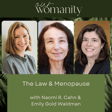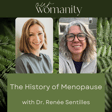
17. Navigating Menopause: Hormone Therapy or Birth Control? with Dr. James H. Liu
Navigating Menopause Part 1: Hormone Therapy or Birth Control?
September is Perimenopause Awareness Month! And we are diving into all things perimenopause and menopause.
In Part 1 of this episode, we dive deep into the complexities of perimenopause and menopause with expert guidance from Dr. James H. Liu, a renowned menopause expert and past president of the Menopause Society. As we celebrate Perimenopause Awareness Month, we aim to shed light on the common symptoms and treatments women experience during this transformative phase of life.
Here is some practical advice from one of the top voices in the menopause field, Dr. James H. Liu on the difference between hormone therapy and birth control for managing symptoms like hot flashes, vaginal dryness, and irregular periods.
Follow us on social media:
- Instagram: @drrpope
- TikTok: @vulvadoctor
- Twitter: @drrpope
Want more from Our Womanity?
If you enjoyed this episode of Our Womanity, please subscribe, rate, and leave a review. Your feedback helps us continue to bring you engaging and empowering content.



















